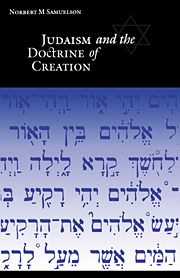Book contents
- Frontmatter
- Contents
- Preface
- Introduction
- PART 1 THE MODERN DOGMA OF CREATION
- PART 2 A JEWISH VIEW OF CREATION
- Chapter 3 Classical Jewish philosophy
- Chapter 4 Classical rabbinic commentaries
- PART 3 THE FOUNDATIONS FOR THE JEWISH VIEW OF CREATION
- PART 4 A BELIEVABLE VIEW OF CREATION
- Notes
- Select bibliography
- Indices
Chapter 4 - Classical rabbinic commentaries
Published online by Cambridge University Press: 08 January 2010
- Frontmatter
- Contents
- Preface
- Introduction
- PART 1 THE MODERN DOGMA OF CREATION
- PART 2 A JEWISH VIEW OF CREATION
- Chapter 3 Classical Jewish philosophy
- Chapter 4 Classical rabbinic commentaries
- PART 3 THE FOUNDATIONS FOR THE JEWISH VIEW OF CREATION
- PART 4 A BELIEVABLE VIEW OF CREATION
- Notes
- Select bibliography
- Indices
Summary
At the beginning of this book we presented the picture of the universe that Franz Rosenzweig developed in The Star as the leading candidate for a text on which to base a Jewish philosophy of creation. The central question of this (the second) part of this book is whether or not that philosophy can be called “Jewish,” which we interpreted to mean, does Gersonides' account of creation follow from classical texts of Judaism and is it coherent with them. We began to answer that question by examining what classical Jewish philosophy has to say in comparison with Rosenzweig's philosophy. For this comparison we referred to a number of works in philosophy in the Aristotelian tradition of Jewish thought, beginning with Abraham Ibn Daud's Exalted Faith and culminating in Gersonides' Wars. That survey and comparison has brought us to a tentative affirmative answer to our question.
The reason that the affirmation of the Jewishness of Rosenzweig's doctrine of creation is only tentative is because the tradition of Jewish philosophy, from Saadia through Albo, is only one major source for classical rabbinic thought. Another, equally important source, is the collection of classical rabbinic commentaries on the biblical text itself, particularly (for our purposes) on the opening narrative in the Torah. We looked first at the statements of the Jewish philosophers because these works, precisely because they are philosophy, provide the clearest and most detailed statements of what the rabbis believed about the creation of the universe. Hence, they are the clearest basis for drawing our comparison. However, logically, the theological commentaries have priority over the philosophical works.
- Type
- Chapter
- Information
- Judaism and the Doctrine of Creation , pp. 107 - 154Publisher: Cambridge University PressPrint publication year: 1994



